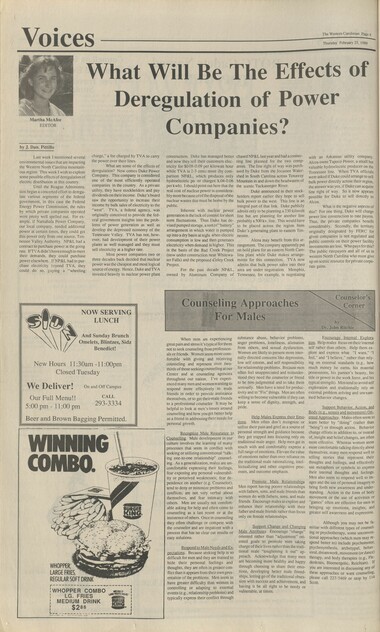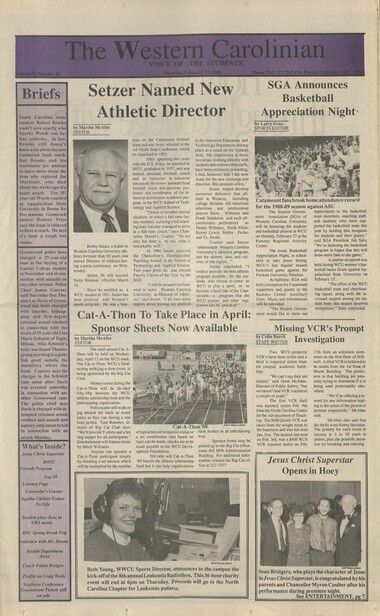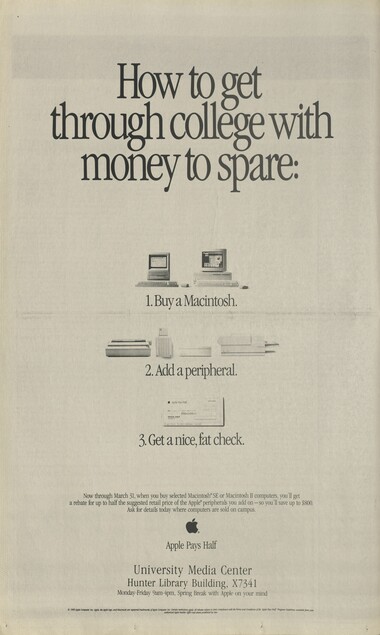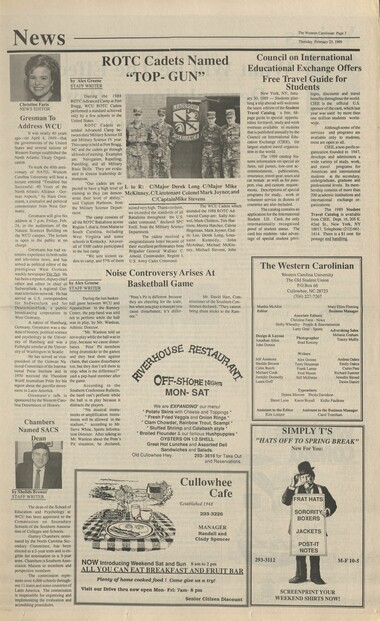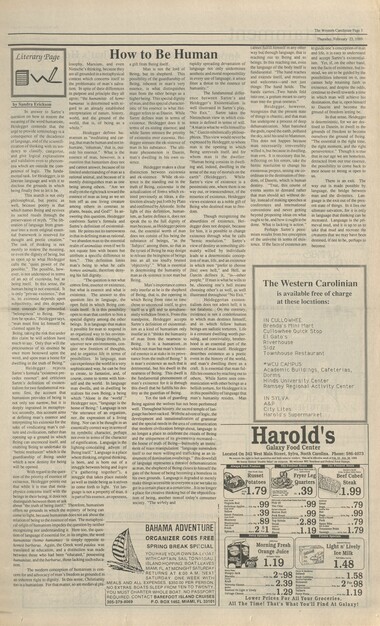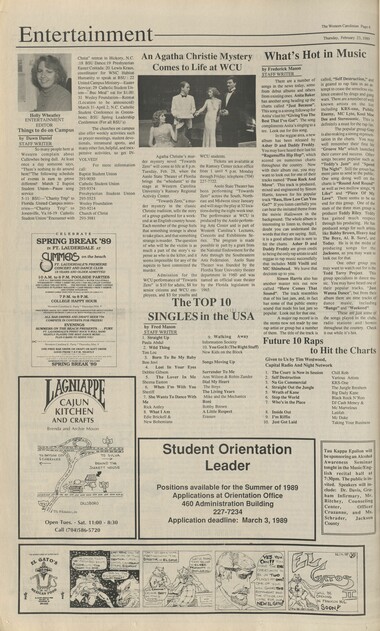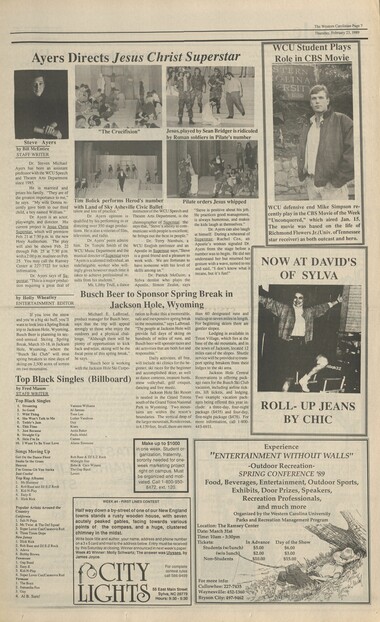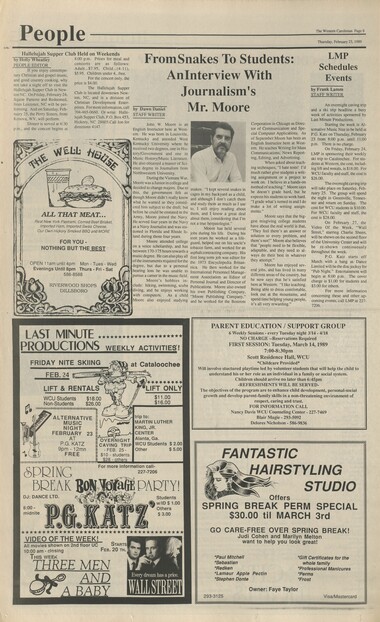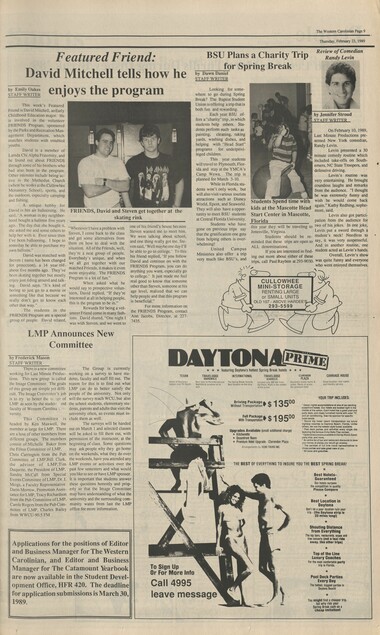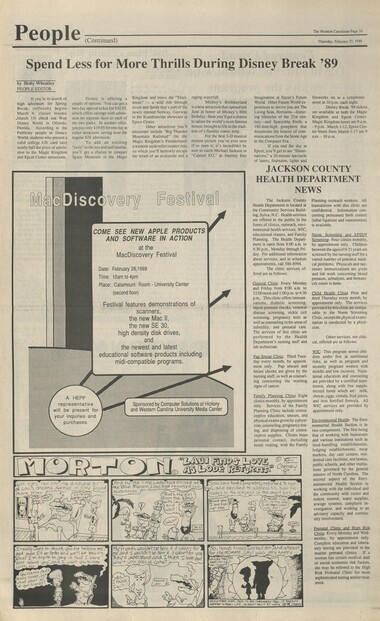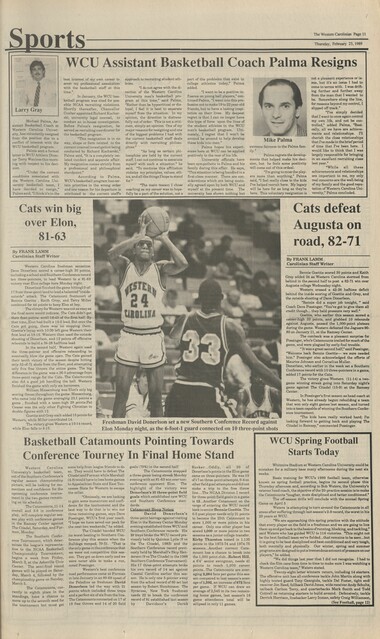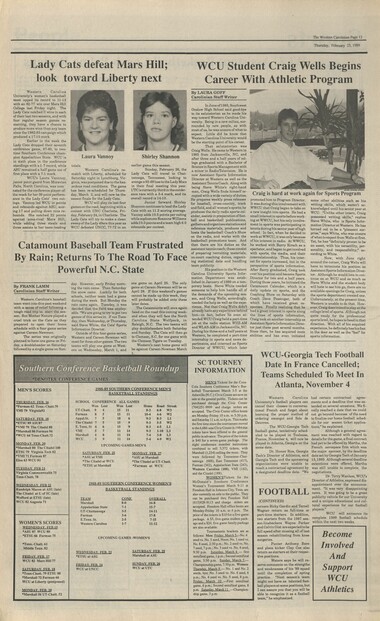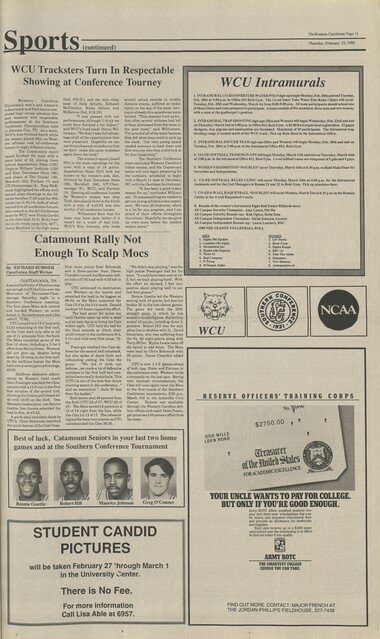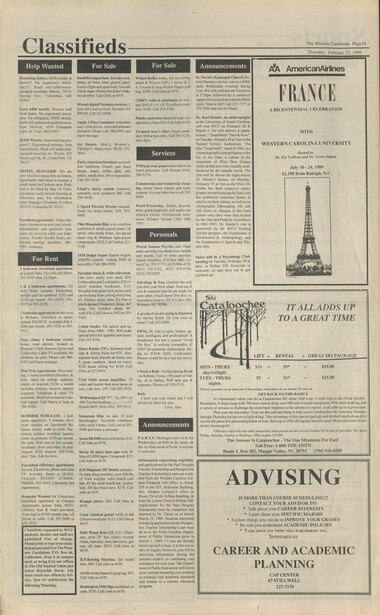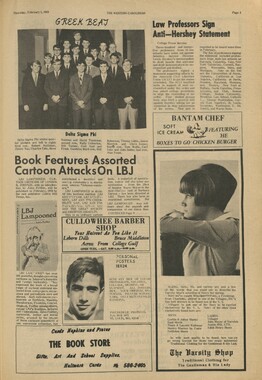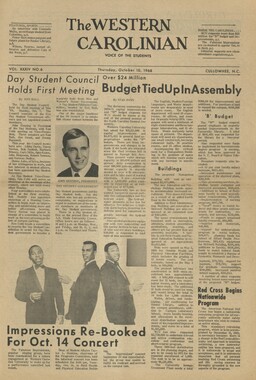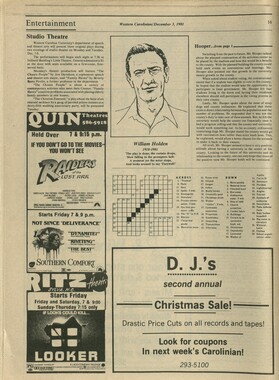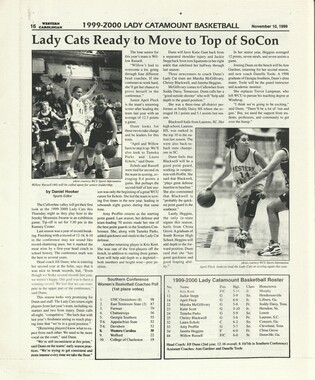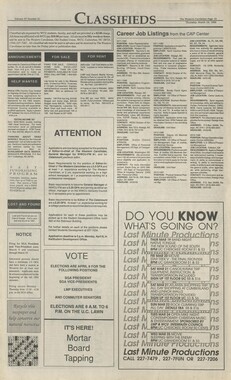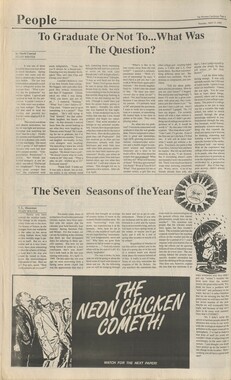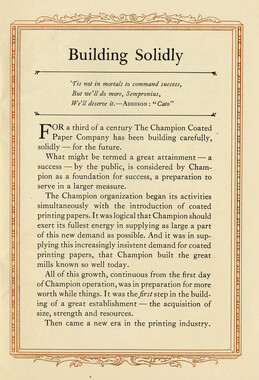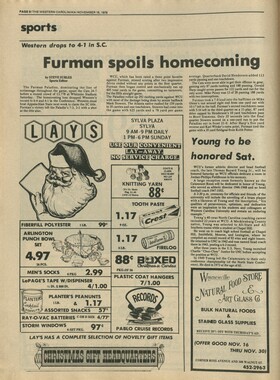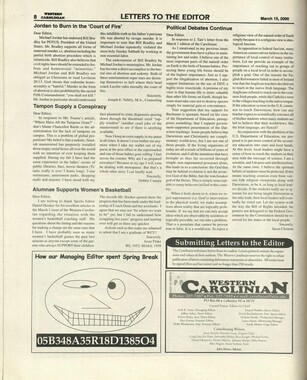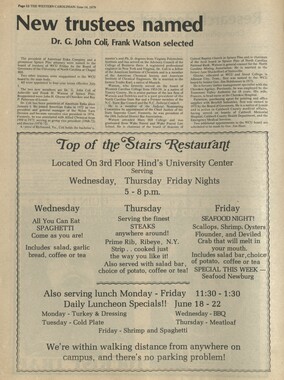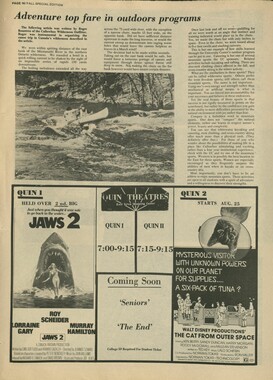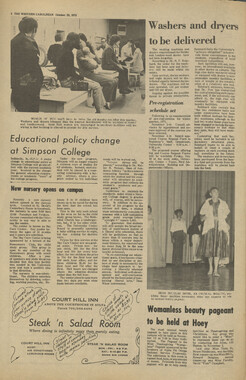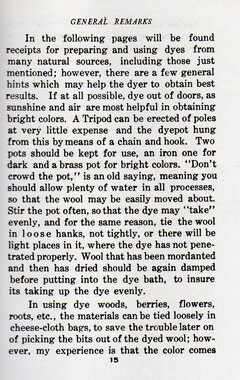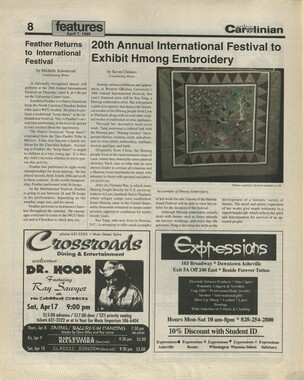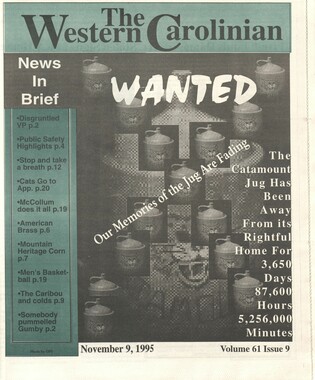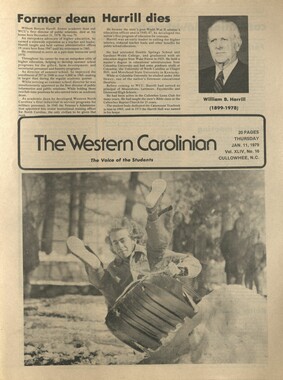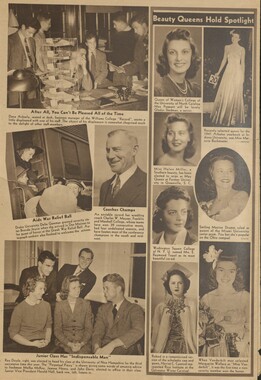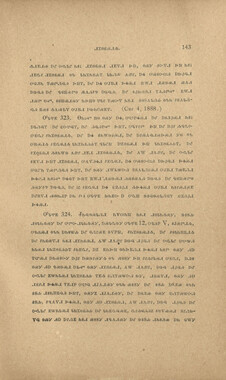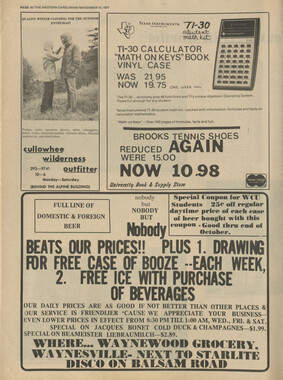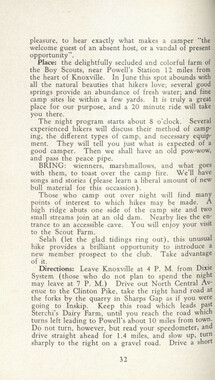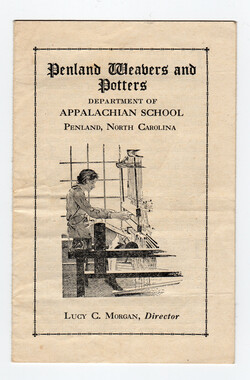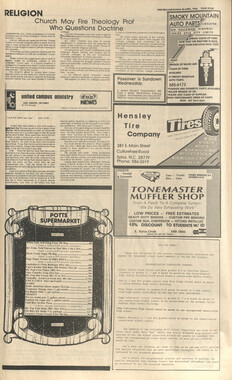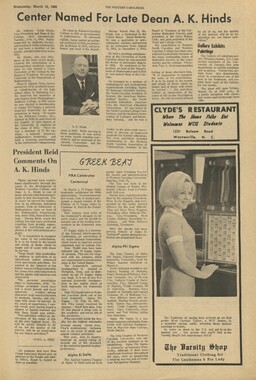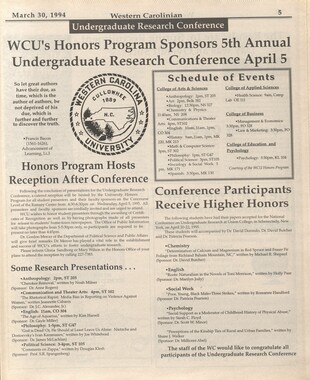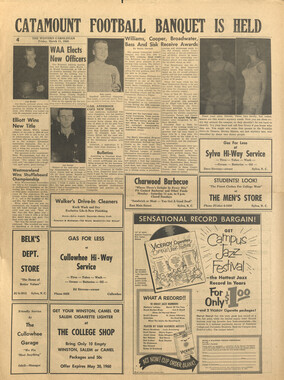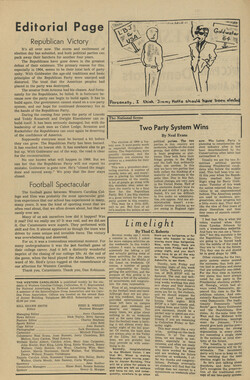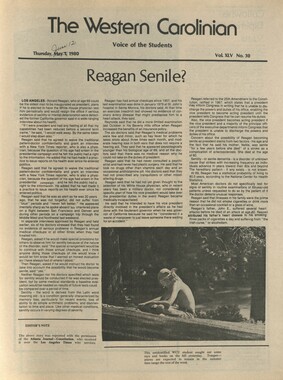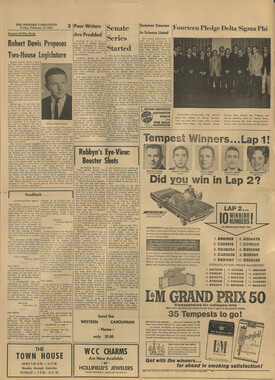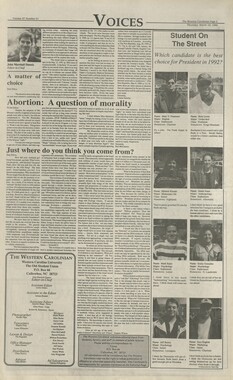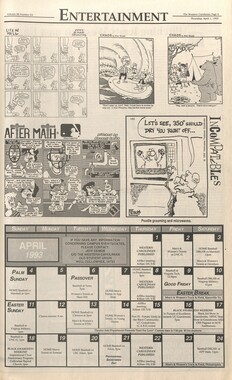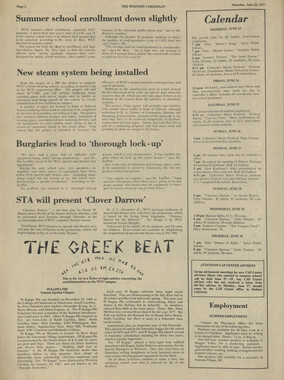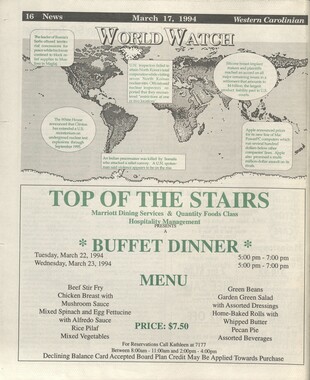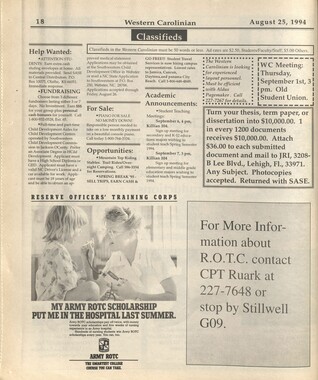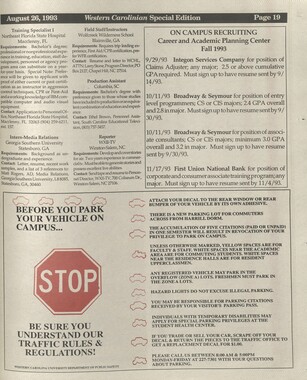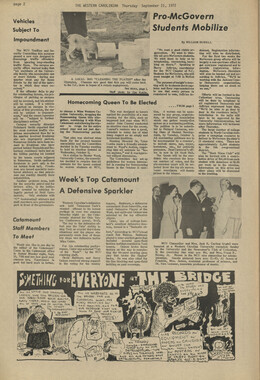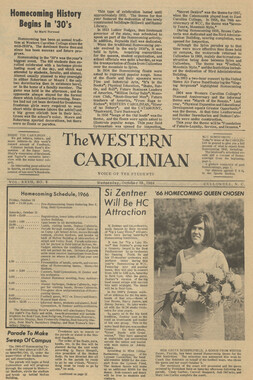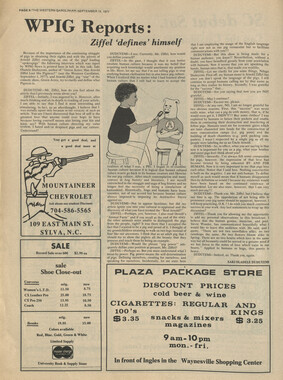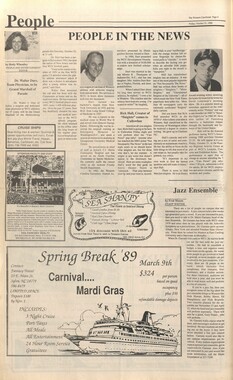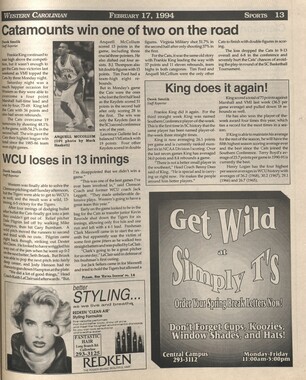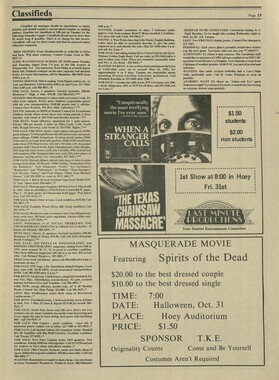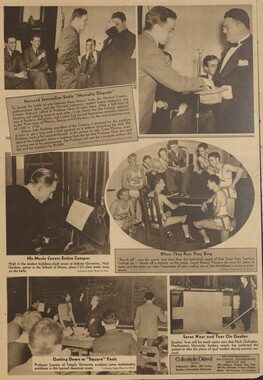Western Carolina University (20)
View all
- Canton Champion Fibre Company (2308)
- Cherokee Traditions (292)
- Civil War in Southern Appalachia (165)
- Craft Revival (1942)
- Great Smoky Mountains - A Park for America (2766)
- Highlights from Western Carolina University (430)
- Horace Kephart (941)
- Journeys Through Jackson (154)
- LGBTQIA+ Archive of Jackson County (85)
- Oral Histories of Western North Carolina (314)
- Picturing Appalachia (6772)
- Stories of Mountain Folk (413)
- Travel Western North Carolina (160)
- Western Carolina University Fine Art Museum Vitreograph Collection (129)
- Western Carolina University Herbarium (92)
- Western Carolina University: Making Memories (708)
- Western Carolina University Publications (2283)
- Western Carolina University Restricted Electronic Theses and Dissertations (146)
- Western North Carolina Regional Maps (71)
- World War II in Southern Appalachia (131)
University of North Carolina Asheville (6)
View all
- Western Carolina College (199)
- Western Carolina Teachers College (239)
- Western Carolina University (1792)
- Allanstand Cottage Industries (0)
- Appalachian National Park Association (0)
- Bennett, Kelly, 1890-1974 (0)
- Berry, Walter (0)
- Brasstown Carvers (0)
- Cain, Doreyl Ammons (0)
- Carver, George Washington, 1864?-1943 (0)
- Cathey, Joseph, 1803-1874 (0)
- Champion Fibre Company (0)
- Champion Paper and Fibre Company (0)
- Cherokee Indian Fair Association (0)
- Cherokee Language Program (0)
- Crittenden, Lorraine (0)
- Crowe, Amanda (0)
- Edmonston, Thomas Benton, 1842-1907 (0)
- Ensley, A. L. (Abraham Lincoln), 1865-1948 (0)
- Fromer, Irving Rhodes, 1913-1994 (0)
- George Butz (BFS 1907) (0)
- Goodrich, Frances Louisa (0)
- Grant, George Alexander, 1891-1964 (0)
- Heard, Marian Gladys (0)
- Kephart, Calvin, 1883-1969 (0)
- Kephart, Horace, 1862-1931 (0)
- Kephart, Laura, 1862-1954 (0)
- Laney, Gideon Thomas, 1889-1976 (0)
- Masa, George, 1881-1933 (0)
- McElhinney, William Julian, 1896-1953 (0)
- Niggli, Josephina, 1910-1983 (0)
- North Carolina Park Commission (0)
- Osborne, Kezia Stradley (0)
- Owens, Samuel Robert, 1918-1995 (0)
- Penland Weavers and Potters (0)
- Rhodes, Judy (0)
- Roberts, Vivienne (0)
- Roth, Albert, 1890-1974 (0)
- Schenck, Carl Alwin, 1868-1955 (0)
- Sherrill's Photography Studio (0)
- Smith, Edward Clark (0)
- Southern Highland Handicraft Guild (0)
- Southern Highlanders, Inc. (0)
- Stalcup, Jesse Bryson (0)
- Stearns, I. K. (0)
- Thompson, James Edward, 1880-1976 (0)
- United States. Indian Arts and Crafts Board (0)
- USFS (0)
- Vance, Zebulon Baird, 1830-1894 (0)
- Weaver, Zebulon, 1872-1948 (0)
- Western Carolina University. Mountain Heritage Center (0)
- Whitman, Walt, 1819-1892 (0)
- Wilburn, Hiram Coleman, 1880-1967 (0)
- Williams, Isadora (0)
- 1920s (57)
- 1930s (69)
- 1940s (114)
- 1950s (66)
- 1960s (314)
- 1970s (599)
- 1980s (406)
- 1990s (379)
- 2000s (195)
- 2010s (83)
- 1600s (0)
- 1700s (0)
- 1800s (0)
- 1810s (0)
- 1820s (0)
- 1830s (0)
- 1840s (0)
- 1850s (0)
- 1860s (0)
- 1870s (0)
- 1880s (0)
- 1890s (0)
- 1900s (0)
- 1910s (0)
- 2020s (0)
- Jackson County (N.C.) (2282)
- Appalachian Region, Southern (0)
- Asheville (N.C.) (0)
- Avery County (N.C.) (0)
- Blount County (Tenn.) (0)
- Buncombe County (N.C.) (0)
- Cherokee County (N.C.) (0)
- Clay County (N.C.) (0)
- Graham County (N.C.) (0)
- Great Smoky Mountains National Park (N.C. and Tenn.) (0)
- Haywood County (N.C.) (0)
- Henderson County (N.C.) (0)
- Knox County (Tenn.) (0)
- Knoxville (Tenn.) (0)
- Lake Santeetlah (N.C.) (0)
- Macon County (N.C.) (0)
- Madison County (N.C.) (0)
- McDowell County (N.C.) (0)
- Mitchell County (N.C.) (0)
- Polk County (N.C.) (0)
- Qualla Boundary (0)
- Rutherford County (N.C.) (0)
- Swain County (N.C.) (0)
- Transylvania County (N.C.) (0)
- Watauga County (N.C.) (0)
- Waynesville (N.C.) (0)
- Yancey County (N.C.) (0)
- Newsletters (510)
- Publications (documents) (1773)
- Aerial Photographs (0)
- Aerial Views (0)
- Albums (books) (0)
- Articles (0)
- Artifacts (object Genre) (0)
- Bibliographies (0)
- Biography (general Genre) (0)
- Cards (information Artifacts) (0)
- Clippings (information Artifacts) (0)
- Crafts (art Genres) (0)
- Depictions (visual Works) (0)
- Design Drawings (0)
- Drawings (visual Works) (0)
- Envelopes (0)
- Facsimiles (reproductions) (0)
- Fiction (general Genre) (0)
- Financial Records (0)
- Fliers (printed Matter) (0)
- Glass Plate Negatives (0)
- Guidebooks (0)
- Internegatives (0)
- Interviews (0)
- Land Surveys (0)
- Letters (correspondence) (0)
- Manuscripts (documents) (0)
- Maps (documents) (0)
- Memorandums (0)
- Minutes (administrative Records) (0)
- Negatives (photographs) (0)
- Newspapers (0)
- Occupation Currency (0)
- Paintings (visual Works) (0)
- Pen And Ink Drawings (0)
- Periodicals (0)
- Personal Narratives (0)
- Photographs (0)
- Plans (maps) (0)
- Poetry (0)
- Portraits (0)
- Postcards (0)
- Programs (documents) (0)
- Questionnaires (0)
- Scrapbooks (0)
- Sheet Music (0)
- Slides (photographs) (0)
- Songs (musical Compositions) (0)
- Sound Recordings (0)
- Specimens (0)
- Speeches (documents) (0)
- Text Messages (0)
- Tintypes (photographs) (0)
- Transcripts (0)
- Video Recordings (physical Artifacts) (0)
- Vitreographs (0)
- The Reporter, Western Carolina University (510)
- WCU Students Newspapers Collection (1744)
- A.L. Ensley Collection (0)
- Appalachian Industrial School Records (0)
- Appalachian National Park Association Records (0)
- Axley-Meroney Collection (0)
- Bayard Wootten Photograph Collection (0)
- Bethel Rural Community Organization Collection (0)
- Blumer Collection (0)
- C.W. Slagle Collection (0)
- Canton Area Historical Museum (0)
- Carlos C. Campbell Collection (0)
- Cataloochee History Project (0)
- Cherokee Studies Collection (0)
- Daisy Dame Photograph Album (0)
- Daniel Boone VI Collection (0)
- Doris Ulmann Photograph Collection (0)
- Elizabeth H. Lasley Collection (0)
- Elizabeth Woolworth Szold Fleharty Collection (0)
- Frank Fry Collection (0)
- George Masa Collection (0)
- Gideon Laney Collection (0)
- Hazel Scarborough Collection (0)
- Hiram C. Wilburn Papers (0)
- Historic Photographs Collection (0)
- Horace Kephart Collection (0)
- Humbard Collection (0)
- Hunter and Weaver Families Collection (0)
- I. D. Blumenthal Collection (0)
- Isadora Williams Collection (0)
- Jesse Bryson Stalcup Collection (0)
- Jim Thompson Collection (0)
- John B. Battle Collection (0)
- John C. Campbell Folk School Records (0)
- John Parris Collection (0)
- Judaculla Rock project (0)
- Kelly Bennett Collection (0)
- Love Family Papers (0)
- Major Wiley Parris Civil War Letters (0)
- Map Collection (0)
- McFee-Misemer Civil War Letters (0)
- Mountain Heritage Center Collection (0)
- Norburn - Robertson - Thomson Families Collection (0)
- Pauline Hood Collection (0)
- Pre-Guild Collection (0)
- Qualla Arts and Crafts Mutual Collection (0)
- R.A. Romanes Collection (0)
- Rosser H. Taylor Collection (0)
- Samuel Robert Owens Collection (0)
- Sara Madison Collection (0)
- Sherrill Studio Photo Collection (0)
- Smoky Mountains Hiking Club Collection (0)
- Stories of Mountain Folk - Radio Programs (0)
- Venoy and Elizabeth Reed Collection (0)
- WCU Gender and Sexuality Oral History Project (0)
- WCU Mountain Heritage Center Oral Histories (0)
- WCU Oral History Collection - Mountain People, Mountain Lives (0)
- Western North Carolina Tomorrow Black Oral History Project (0)
- William Williams Stringfield Collection (0)
- Zebulon Weaver Collection (0)
- College student newspapers and periodicals (1769)
- African Americans (0)
- Appalachian Trail (0)
- Artisans (0)
- Cherokee art (0)
- Cherokee artists -- North Carolina (0)
- Cherokee language (0)
- Cherokee pottery (0)
- Cherokee women (0)
- Church buildings (0)
- Civilian Conservation Corps (U.S.) (0)
- Dams (0)
- Dance (0)
- Education (0)
- Floods (0)
- Folk music (0)
- Forced removal, 1813-1903 (0)
- Forest conservation (0)
- Forests and forestry (0)
- Gender nonconformity (0)
- Great Smoky Mountains National Park (N.C. and Tenn.) (0)
- Hunting (0)
- Landscape photography (0)
- Logging (0)
- Maps (0)
- Mines and mineral resources (0)
- North Carolina -- Maps (0)
- Paper industry (0)
- Postcards (0)
- Pottery (0)
- Railroad trains (0)
- Rural electrification -- North Carolina, Western (0)
- School integration -- Southern States (0)
- Segregation -- North Carolina, Western (0)
- Slavery (0)
- Sports (0)
- Storytelling (0)
- Waterfalls -- Great Smoky Mountains (N.C. and Tenn.) (0)
- Weaving -- Appalachian Region, Southern (0)
- Wood-carving -- Appalachian Region, Southern (0)
- World War, 1939-1945 (0)
- Text (2283)
- MovingImage (0)
- Sound (0)
- StillImage (0)
Western Carolinian Volume 54 Number 20
Item
Item’s are ‘child’ level descriptions to ‘parent’ objects, (e.g. one page of a whole book).
-
-
Voices The Western Carolinian Page 4 Thursday February 23,1989 Martha McAfee EDITOR What Will Be The Effects Deregulation of Power Companies? by J. Dan. Pittillo Last week I mentioned several environmental issues that are impacting the Western North Carolina mountainous region. This week I wish to explore some possible effects of deregulation of electric distribution in this country. Until the Reagan Administration began a concerted effort to deregulate various segments of the federal government, in this case the Federal Energy Power Commission, the rules by which private companies operated were pretty well spelled out. For example, if Nantahala Power Company, our local company, needed additional power at certain times, they could get this power only from one source, Tennessee Valley Authority. NP&L had a contract to purchase power at the going rate. IfTVA didn't have enough to meet their demands, they could purchase power elsewhere. If NP&L had to purchase electricity beyond TVA, they could do so, paying a "wheeling charge," a fee charged by TVA to carry the power over their lines. What are some of the effects of deregulation? Now comes Duke Power Company. This company is considered one of the most efficiendy operated companies in the country. As a private utility, they have stockholders and pay dividends on their income. Duke's board saw the opportunity to increase their income by bulk sales of electricity to the "west". TVA, a federal agency, was originally conceived to provide the federal government insights into the problems of power generation as well as develop the depressed economy of the Tennessee Valley. TVA has not, however, had development of their power plants as well managed and they must sell electricity at a higher rate. Most power companies two or three decades back decided that nuclear power was the cheapest and most logical source of energy. Hence, Duke and TV A invested heavily in nuclear power plant construction. Duke has managed better and now they sell their customers electricity for $0 08-0.09 per kilowatt hour while TVA is 2-3 cents more (by comparison NP&L, which produces only hydroelectric po /er charges $.04-0.06 per kwh). I should point out here that the real cost of nuclear power is considerably more because of of the disposal of the nuclear wastes that must be borne by the public. Inherent with nuclear power generation is the lack of control for short term fluctuations. Thus Duke has devised pumped storage, a sort of "battery" arrangement in which water is pumped up into a dry basin at nighi when electric consumption is low and then generates electricity when demand is higher. This is the basis of the Bad Creek Project (now under construction near Whitewater Falls) and the proposed vColey Creek Project. For the past decade NP&L, owned by Aluminum Company of chased NP&L last year and had a connecting line planned for the two companies. The line right of way was purchased by Duke from the Jocassee Watershed in South Carolina across Toxaway Mountain in and down the headwaters of the scenic Tuckaseegee River. Duke announced in their stockholders report earlier they hope to sell bulk power to the west. This line is an integral part of that link. Duke publicly admits only to be planning a 230 kilovolt line but are planning for another line probably a 500 kv. line. This would have to be placed across the region from Duke's generating plant to eastern Tennessee. Alcoa may benefit from this arrangement. The company apparently put on hold plans for an eastern North Carolina plant while Duke makes arrangements for this connection. TVA now admits that bulk power sales into their area are under negotiation. Memphis, Tennessee, for example, is negotiating with an Arkansas utility company. Alcoa owns Tapoco Power, a small but valuable hydroelectric producer on the Tennessee line. When TVA officials were asked if Duke could arrange to sell bulk power directly across their region, the answer was yes, if Duke can acquire line right of way. So it now appears possible for Duke to sell direcdy to Alcoa. What is the negative aspects of this? For one thing, Duke will charge power line construction to rate payers. Thus, the private companies benefit considerably. Secondly, the territory originally designated by FERC for given companies is not regulated and public controls on their power facility investments are lost. Who pays for this? The public ratepayers and all of us in western North Carolina who must give up on scenic resource for private corporate gains. NOW SERVING LUNCH And Sunday Brunch Omelets, Blintzes, Sidz Benedict! New Hours 11:30am -11:00pm Closed Tuesday We Deliver! OnandOffCampus Our Full Menu!! 5:00 pm- 11:00 pm Beer and Brown Bagging Permitted. CALL 293-3334 COMBO whopper; urge fries, reguur soft drink WHOPPER COMBO -do* LG. FRIES u-jjgg* MEDIUM DRINK HRgff $286 QiS£. I Cou Approaches or Males ■»»■■ ■■■■ ■ ;.' Comer stm Wt(ftPi't*Ytti\ ■■■■ ■ ■, ■■■■■■■,,■ ■ ■ .■ i • 11i'•'{■ i''■ ■ ■ iiI::ii i:iiiii11riui iiiii:i■■'■ i* When men are experiencing great pain and stress it's typical for them not to seek counseling from professionals or friends. Women seem more comfortable with giving and receiving counseling and represent over two- thirds of those seekingcounseling at our Center and at counseling agencies throughout our nation. I've experienced many men and women wanting to respond more effectively to male friends in order to provide assistance themselves, or to get theirmale friends to a professional counselor. It may be helpful to look at men's issues around counseling and how you get better help as a friend in addressing their needs for personal growth. Recognize Male Resistance to Counseling. Male development in our culture involves the learning of many processes that seem in conflict with seeking or utilizing conventional "talking one-to-one relationship" counseling. As a generalization, males are uncomfortable expressing their feelings, fear exposing any personal vulnerability or perceived weaknesses; fear dependence on another (e.g. Counselor); tend to deny or minimize problems and conflicts; are not very verbal about themselves, and fear intimacy with others. Men are usually not comfortable asking for help and often come to counseling as a last resort or at the insistence of others. Once in counseling they often challenge or compete with the counselor and are impatient with a process that has no clear cut results or easy solutions. Respond to Male Needs and Expectations. Because seeking help is so difficult for men and they are trained to hide their personal feelings and thoughts, they are often in greater conflict than it appears from their own presentation of the problems. Men seem to have greater difficulty than women in controlling or adapting to external events (e.g., relationship problems) and typically express their conflict through substance abuse, behavior problems, anger problems, loneliness, alienation from others, and sexual dysfunction. Women are likely to present more internally directed concerns like depression, low self esteem, and self responsibility for relationship problems. Because men often feel unappreciated and misunderstood they need the counselor or friend to be non-judgmental and to take them seriously. Men have a need for productivity and to "Fix" things. Men are often willing to become vulnerable if they can keep a sense of dignity, strength, and pride. Help Males Express their Emotions. Men often don't recognize or utilize their pain and grief as a source of personal strength and guidance because they get trapped into focusing only on traditional male anger. Help men get in touch with and comfortably express a full range of emotions. Elevate the value of emotions rather than over reliance on the traditional male rationalizing, intel- lcctualizing and other cognitive processes, and outcome emphasis. Promote Male Relationships Men report having poorer relationships with fathers, sons, and male friends than women do with fathers, sons, and male friends. Encourage males to explore and enhance their relationship with their father and male friends rather than focus only on female relationships. Support Change and Changing Male Attributes Encourage "change" oriented rather than "adjustment" oriented goals to promote men taking charge of their lives rather than the traditional male "toughening it out" approach. Acknowledge that many men are becoming more healthy and happy through choosing to share their emotions, developing better male friendships, letting go of the traditional obsession with success and achievement, and having it be all right to be needy or vulnerable, at times. Encourage Internal Exploration. Help males focus on their internal self rather than others. Help them explore and express what "I want," "I feel," and "I believe," rather than relying on external standards (e.g., how much money he earns, his material possessions, his partner's beauty, his title or power in the work force, and his typical strength). Men tend to avoid self exploration and traditionally rely on external problem solving and unexamined behavior changes. Support Behavior. Action, and Body (e.g.. senses and movement) Oriented Approaches. Males often seem to learn better by "doing" (rather than "being") or through action. Behavior change efforts in addition to, or instead of, insight and belief changes, are often more effective. Whereas women seem more comfortable talking directly about themselves, many men respond well to telling stories that represent their thoughts and feelings, and effectively use metaphors or symbols to express their internal thoughts and feelings. Men also seem to respond well to images and the use of personal imagery to bring forth new awareness and understanding. Action in the form of body movement or the use of activities or "games" often are effective for men in bringing up emotions, insights, and greater self awareness and expression. Although you may not be familiar with different types of counseling or psychotherapy, some unconventional approaches (which men may respond better to) include psychomotor, psychosynthesis, archetypal, behavioral, dream work, movement (or dance) therapy, and body therapies (e.g., Fle- denkrais, Bioenergetic, Reichian). If you are interested in discussing any of these approaches or want counseling- please call 227-7469 or stop by H4 Scott.
Object
Object’s are ‘parent’ level descriptions to ‘children’ items, (e.g. a book with pages).
-
The Western Carolinian is Western Carolina University’s student-run newspaper. The paper was published as the Cullowhee Yodel from 1924 to 1931 before changing its name to The Western Carolinian in 1933.
-
